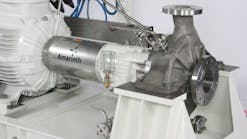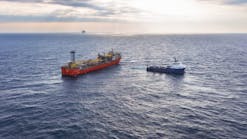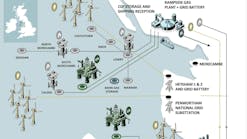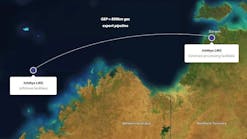Judy Maksoud • Houston
Africa
ChevronTexaco affiliate ChevronTexaco JDZ Ltd. was awarded the right to conduct exploration activities in deepwater block 1 in the Joint Development Zone (JDZ) off Nigeria and Sáo Tomé and Príncipe. Block 1 is 190 mi north of the city of Sáo Tomé in 5,700 ft of water.
This award follows the company's $123-million bid for the block, which was unveiled at a public ceremony in Sáo Tomé in Oct. 2003.
George Kirkland, president of Chevron-Texaco Overseas Petroleum said, "This represents a new opportunity to expand and strengthen further ChevronTexaco's asset base in West Africa in alignment with our growth strategy for the region."
ChevronTexaco will operate the block with 51% interest. ExxonMobil has been awarded a 40% interest. The remaining 9% has been awar- ded to Norway's Equity Energy Resources.
Angola's deepwater block 32 has recorded a second oil discovery. The Canela-1 well was drilled in 5,050-ft water depth and tested at a rate of 6,800 b/d of oil from one reservoir. The well is in the eastern part of block 32, 10 mi southeast of Gindungo-1, the first discovery on the block, announced in 2003.
There have been more than 35 discoveries on Angola blocks 15, 17, 31, and 32 recently.
Total Exploration & Production Angola (Block 32) Ltd. operates the block with 30% interest. Partners include Marathon Pet-roleum Angola Block 32 Ltd. with 30% interest, ExxonMobil's subsidiary Esso Explor- ation and Production Angola (Overseas) Ltd. with 15% interest, Sociedade Nacional de Combustiveis de Angola (Sonangol) with 20% interest, and Petrogal Exploracao with the remaining 5%. Sonangol is the concessionaire for the block.
Americas
Repsol YPF has signed a production-sharing contract with the Surinamese state-owned company Staatsolie for block 30, 100 km offshore. The contract was signed April 24.
Block 30 covers 18,600 sq km and is in the Guyana-Suriname basin, where oil is currently produced at the Tambaredjo and Calcutta fields near Paramaribo.
The production sharing contract is for thirty years, and includes a six-year exploration period. A 2D seismic survey covering 1,800 km could begin by 4Q 2004.
This contract is the result of a two-year technical study of the region administered by Repsol YPF and based on existing seismic and geological data on offshore Suriname supplied by Staatsolie.
Repsol YPF will explore offshore Suriname.
null
The Mexican Gulf of Mexico has seen a lot of exploration activity in the last year, and recent budgeting has allocated a sizable sum for gas development. Now, Pemex is looking to purchase foreign deepwater drilling technology that will allow the company to carry its E&P program into deeper waters.
Pemex is reportedly in discussions with several major oil companies.
At present, Pemex is the only company permitted to explore offshore Mexico. The draw of the present negotiations for foreign oil companies is the opportunity to get a foot in the door. If the industry opens to foreign oil companies, they will be positioned to move quickly and will have some history working with Pemex.
Pemex is planning to drill its first deep-water well sometime later this year.
Europe
In late April, WesternGeco announced that Hydro had awarded the company a contract to conduct acquisition and processing of two 3D surveys over the Oseberg field offshore Norway.
Using the proprietary Q-Marine single-sensor marine seismic system, the 4D project repeats heritage surveys over areas of 906 and 191 sq km.
Jens-Petter Kvarstein, geophysical operations manager at Hydro said, "We also expect the high-resolution Q survey to provide improved knowledge of the field for asset management and reduced development risk."
The vessel, Geco Topaz, will carry out the survey towing six 3,600-m cables with spreads of 750 m and 500 m and using the WesternGeco proprietary calibrated Q-Mar-ine source.
Statoil and Norsk Hydro Production have awarded Ocean Rig a letter of intent to drill three exploration wells in the Barents Sea, plus an option to drill a well for Hydro in the North Sea prior to the Barents Sea program. Drilling is to begin in the Barents Sea between Oct. 1 and Dec. 31, 2004. The firm part of the drilling program is expected to take 135 days.
Ocean Rig was given the option to nominate either the Leiv Eiriksson or Eirik Raude for this drilling program by early May. The contract calls for adding four anchors to upgrade the selected unit to a full eight-point anchoring system in addition to its dynamic positioning system and a mobilization fee of $7.5 million.
Asia-Pacific
Partners in the Pangkah production-sharing contract offshore Indonesia have begun an appraisal drilling campaign. Drilling operations on the first well began with Diamond Offshore's jackup Ocean Sovereign.
Two wells will be drilled to test for a western extension of the Ujung Pangkah gas field. The wells are expected to add substantial new gas reserves to the current core area reserves of 478 bcf. If successful, the wells will also be flow tested to provide additional production performance information ahead of finalizing the Ujung Pangkah development well locations. The opportunity may also be taken to test the productivity of the Ujung Pangkah oil rim, directly underlying the gas accumulation, where 450 MMbbl are mapped in place. Each well is expected to take around one month to complete.
Development sanction is expected by mid 2004. Front-end engineering and design studies have been completed, and the subsurface development plan agreed upon. The development will initially comprise six production wells drilled from a minimum facility offshore wellhead platform with export via a 16-in pipeline to an onshore gas processing facility at Gresik.
If the appraisal drilling campaign is successful, facilities at Ujung Pangkah will be extended to include two further satellite wellhead platforms. Commercial provision has also been made within the Gas Supply Agreement to accommodate the additional reserves, allowing an increase in plateau production to 150 MMcf/d.
Amerada Hess operates the Pangkah PSC with 66% interest. Partners are Dana Petro-leum with 12% interest and ConocoPhillips with 22%.
Mediterranean
BP Egypt has a recent gas discovery in the Ras El Barr concession in the Nile Delta 70 km northeast of Port Said in the Seth development lease of the Ras El Barr (REB) concession.
The shallow-water Taurt discovery well was drilled in 100 m of water to a TD of 1,571 m, encountering gas pay in four intervals. One interval was tested at 22 MMcf/d and was constrained by the capacity of the test equipment. The natural gas is high quality with no impurities and is similar to that of the nearby Ha'py field.
Hesham Mekawi, president of BP Egypt, said, "The proximity of the Taurt discovery to the existing infrastructure reduces the development cycle time and makes this gas extremely cost effective."
Working interest in the concession is split 50/50 between BP, the operator, and ENI's local affiliate IEOC.
Following the lifting of UN sanctions last fall, a number of companies are re-evaluating the potential of Libya's offshore.
Statoil, for one, is looking into opportunities for E&P activities in Libya. According to Statoil, investigations are well under way. Statoil needs to clarify a number of conditions before a final decision can be made, but assessments are being pursued in accordance with guidelines for relations with Libya laid down by Norwegian foreign policy.
US companies have also been permitted by the American authorities to start negotiating with Libya.
Occidental Petroleum met with Libyan leaders in late March to discuss the resumption of the company's operations that were suspended in 1986. Occidental has been successful in North Africa and is anxious to get back into the country's offshore. Plans are in place to open an office in Tripoli in the near future.
Also in late March, Shell Libya Petroleum Development BV signed a heads of agreement with Libya's national oil company to establish a long-term strategic partnership.
Negotiations will continue through the year. And Marathon Oil had plans to meet with Libyan leaders in May.
In May, Libyan officials speaking at the Offshore Technology Conference reiterated plans to offer 215 production-sharing licenses (including two offshore blocks) to international operators in an effort to reverse declining reserves and production figures.
Middle East
McDermott International Inc. subsidiary J. Ray McDermott S.A was awarded additional work offshore Qatar by Ras Laffan LNG Co. Ltd. (II). On March 31, 2004, Ras Laffan exercised the WH9 deck and pipeline option under the RasGas Expansion Project Contract, which was originally awarded to J. Ray three years ago.
Under the WH9 option, J. Ray will handle the turnkey project management, design engineering, procurement, fabrication, installation, hook-up, and mechanical completion of a 2,200-ton wellhead deck, as well as the installation of a 7 km 28-in. intra-field pipeline and 10 km intra-field subsea cable. The project is expected to take 33 months to complete.
The WH9 facility will be similar to the three wellhead platforms already engineered, constructed, and installed by J. Ray under the RasGas Expansion Project. The first platform, WH7, was mechanically completed and handed over in January. The other two platforms, WH4 and WH5, are being fabricated at J. Ray's Jebel Ali yard and are scheduled to be installed next year.
Associated WH4 105-km 38-in. pipeline from the platform to onshore facilities is scheduled for installation during the summer of 2004, 10 months ahead of schedule. The deck is scheduled for installation in the last quarter of 2006. Once in place, it will handle production of 1.2 bcf/d of produced fluids for supply to the onshore plant at Ras Laffan.
"We're pleased to receive the award for another significant sector of the RasGas Expansion project, and it is a welcome addition to our Middle East backlog," said Bob Deason, president and COO of J. Ray McDermott.
RasGas (II) is a joint venture between Qatar Petroleum and Exxon Mobil.
Qatar Petroleum and Mærsk Oil Qatar AS signed an exploration/appraisal and prod-uction-sharing agreement for the offshore block 5 extension area.
The 139-sq-km block is northwest of the Al-Shaheen field, which Mærsk operates under an exploration and production-sharing agreement with QP. The field is still being appraised for development potential. As part of the agreement on the extension area, Mærsk will undertake an extensive work program, which includes detailed geological and geophysical studies and drilling a number of wells.
This agreement is one of a series QP signed with several international oil companies to explore and produce Qatar oil and gas resources.
These agreements have resulted in the discovery, appraisal, development, and produc-tion of several fields such as the Al-Khalij field by Total E&P Qatar, the Al-Shaheen field by Mærsk Oil Qatar AS, the Idd Al-Shargi North Dome and Idd Al-Shargi South Dome fields by Occidental Petroleum of Qatar, and the Al-Rayyan field by Anadarko Qatar Energy Co.
The recent agreement reflects QP's policy to increase the country's hydrocarbon reserves base oil production potential and diversify Qatar national income.






